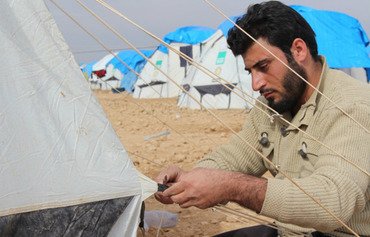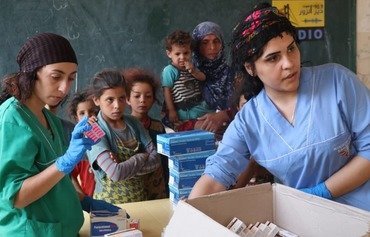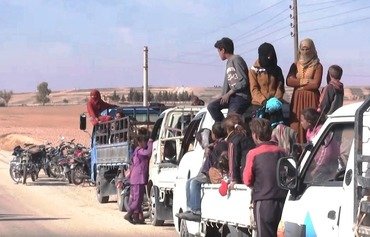Though the "Islamic State of Iraq and Syria" (ISIS) now occupies just a small fraction of the territory it once controlled in Syria, countless families continue to suffer the ill-effects of its incursion.
When the group first gained control of swathes of Syria, particularly in al-Raqa and Deir Ezzor provinces, many residents were forced to flee, said Mohammed Hesso, a relief worker in northern Syria.
After being forced out of the areas it once controlled, ISIS left a trail of destruction behind that has prevented many internally displaced persons (IDPs) from returning, he told Diyaruna.
The city of al-Raqa has been turned into a minefield, he said, noting that most neighbourhoods remain littered with improvised explosive devices (IEDs) planted by the group before it fled.
This has delayed the return of city residents, most of whom still reside in displacement camps, Hesso said.
"The rubble of buildings destroyed in the war against the group also needs to be removed, as do the corpses, many of which are still under the rubble," he said.
Other parts of al-Raqa, Deir Ezzor and al-Hasakeh face the same issues, he said.
ISIS has retained a sliver of territory along the Euphrates River near Albu Kamal, and some small areas in the desert of eastern Syria and on the border with Iraq, though it is increasingly under fire in these areas.
IDPs continue to suffer
Al-Mayadeen native Mayada Abboud Salman, who now lives at al-Sadd displacement camp, told Diyaruna her husband insisted on fleeing the city after it fell to ISIS out of fear for the safety of their two daughters, ages 15 and 16.
"It is well known that girls are a precious treasure for the group’s militants and [many] are forcibly married to the militants," she said.
A "dark fate" would have been in store for her daughters if that were to have happened, she said.
Salman said her family was unable to sell any of their personal belongings before they fled, as that would have revealed their intent to escape.
As they wait to return to their homes, Syrians in the camps are "suffering from a lack of relief", said Azad Dudeki, a Kurdish Red Crescent official in Afrin.
"Most humanitarian organisations have refrained from providing aid out of fear for the lives of their employees," he told Diyaruna, with camp residents suffering most from the lack of medical services.
Children, the elderly and the chronically ill are at highest risk, he said, noting that health concerns are in addition to "the scarcity of water and financial hardships".
"Most of the inhabitants of the areas seized by ISIS work in farming and livestock raising, and a few hold government jobs," Dudeki said, noting that all lost their main source of income when they escaped from the group.

![Civilians from the Syrian province of Deir Ezzor flee the 'Islamic State of Iraq and Syria' for al-Sadd camp in al-Hasakeh province. [Photo courtesy of the Syrian Democratic Forces]](/cnmi_di/images/2018/05/18/12555-Syria-Deir-Ezzor-600_384.jpg)






